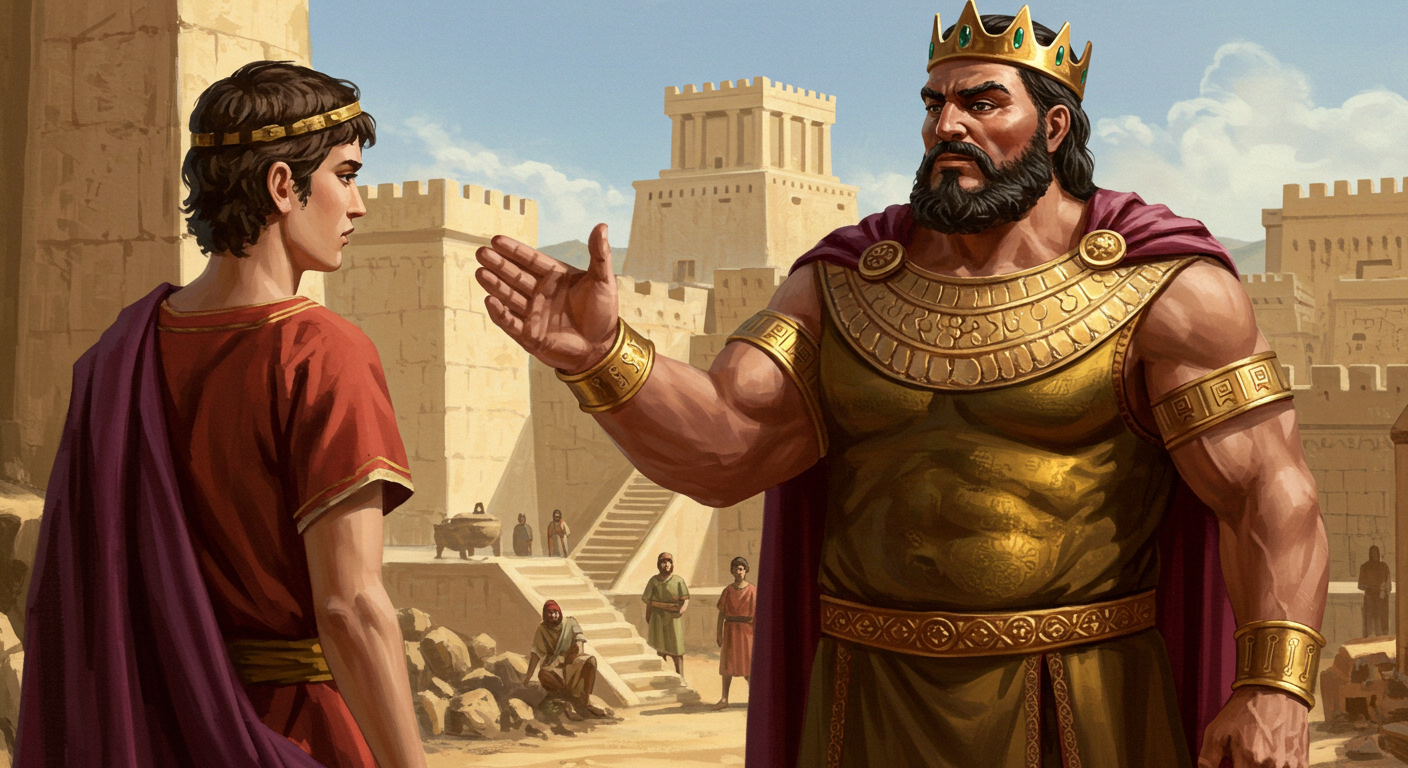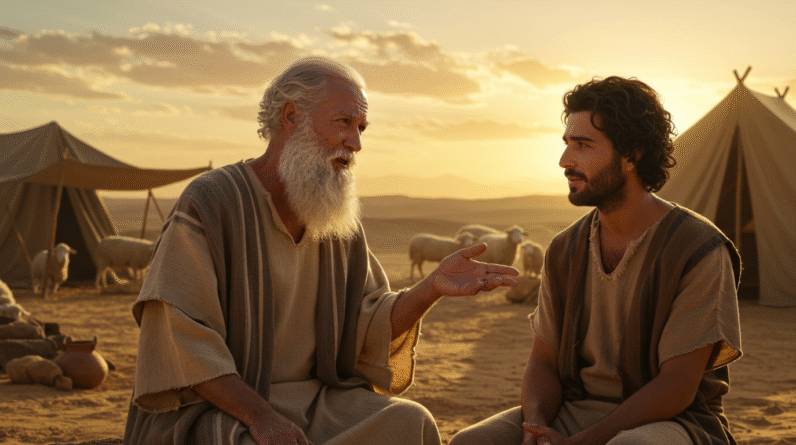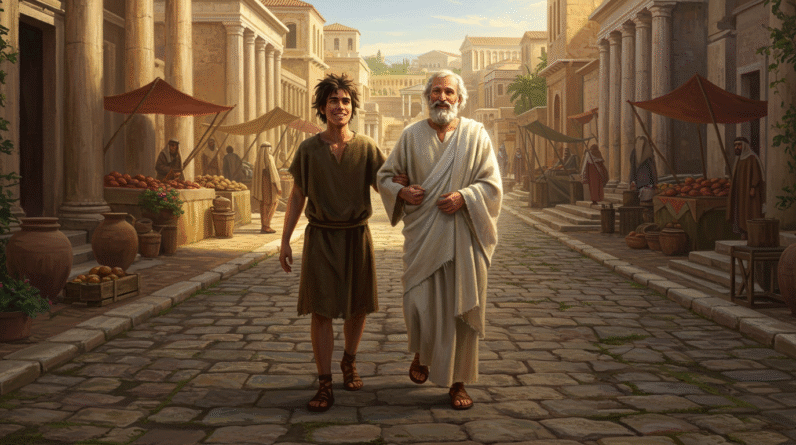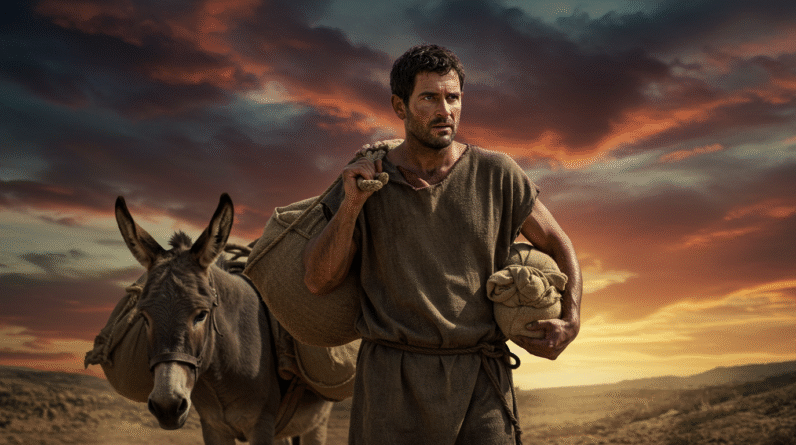Explore Achish’s role during David’s time as a fugitive, highlighting themes of trust, politics, and diplomacy in a world of uncertainty and unexpected alliances.

Achish and His Influence in David’s Refuge
Imagine a world of uncertainty and constant threats, where alliances are as fragile as the desert sand and survival depends on wit and wisdom. This was King David’s world, a man destined for greatness but, for a time, forced to live as a fugitive. In this tumultuous chapter of his life, one character plays a pivotal but often overlooked role: Achish, the Philistine king of Gath. He provided sanctuary to David during one of the most harrowing episodes of his pre-royal journey. This article delves into Achish’s influence on David’s life, exploring the layers of faith, politics, and survival in the biblical narrative.
Achish: A Brief Introduction
Achish, the king of Gath, enters the biblical narrative during a period of significant upheaval and uncertainty. His unexpected alliance with David, Israel’s future king, illuminates the complexities of human relationships and politics. Achish’s willingness to protect David, despite being an enemy of Israel, demonstrates a rare display of trust and diplomacy. By offering David refuge, Achish inadvertently influences the course of history, becoming a key figure in David’s journey to kingship.
Their Story in the Bible
Achish’s story intersects with David’s during one of the most intriguing periods in biblical history. When David fled from King Saul’s relentless pursuit, he sought refuge in Gath, under the protection of Achish (1 Samuel 27:1-7). The decision was a strategic move; by aligning himself with a Philistine king, David aimed to escape Saul’s jurisdiction more effectively. Initially uncertain, Achish welcomed David into his court, granting him and his men the city of Ziklag.
During his time in Gath, David lived in a delicate balance, portraying loyalty to Achish while secretly remaining true to Israel. Achish, convinced of David’s allegiance, placed significant trust in him—even appointing David as his bodyguard (1 Samuel 28:1-2). This period highlighted David’s diplomatic skills, as he navigated the dangerous waters of Philistine politics without compromising his true loyalties.
However, the alliance faced challenges. When the Philistines prepared to battle Israel, the Philistine commanders doubted David’s loyalty and demanded his exclusion from the conflict (1 Samuel 29:3-7). Achish, though disappointed, respected their decision, sending David back to Ziklag. This turn of events allowed David to avoid fighting against his people, preserving his future role as a unifying king.

Lessons from Achish’s Life
Achish’s interactions with David offer several profound lessons, shedding light on the nature of leadership, trust, and strategic alliances.
- Diplomacy Over Confrontation: Achish exemplifies the power of diplomacy, showing that strategic alliances can often yield more security and peace than confrontation. His relationship with David underscores the importance of seeing potential allies even among former foes.
- Trust with Caution: While Achish’s trust in David was not misplaced, it serves as a reminder of the importance of discernment. This scenario illustrates the delicate nature of trust, especially in leadership positions, where the stakes are high.
- Impact of Decisions: Achish’s choice to harbor David in Gath significantly influenced the future king’s path. His story reminds us that our decisions can have lasting ramifications, sometimes impacting history in unforeseen ways.
Connection to Today’s World
Achish’s story offers timeless insights into the dynamics of power and cooperation, applicable even today. In the current global landscape, where conflicts often arise, his example encourages building bridges over walls. Leaders can take a page from Achish’s book, focusing on partnership and mutual benefit rather than adversarial approaches.
Similarly, in our personal lives, Achish’s narrative prompts us to recognize the potential for growth and learning in unexpected relationships. His story teaches that sometimes, the greatest support comes from the most unlikely sources, urging us to keep our hearts open to new connections and possibilities.
Key Bible Verse
A pivotal moment in Achish and David’s relationship can be encapsulated in this verse:
This verse captures the depth of Achish’s trust in David. It highlights the intricacies of their relationship and how perceptions can shape alliances. Despite external pressures and potential risks, Achish’s acceptance of David into his fold illustrates true leadership grounded in trust and perception.
Thought-Provoking Question
As we ponder Achish’s story, an important question emerges: In our interactions, are we building bridges with those different from us, fostering alliances that transcend traditional boundaries?
Historical and Cultural Context
Understanding Achish’s role in the biblical account requires insight into the historical and cultural context of the time. The Philistines and Israelites were perennial enemies, with ongoing skirmishes marking their tumultuous relationship. Philistine cities like Gath were strongholds characterized by their military prowess and strategic significance. Against this backdrop, Achish’s acceptance of David was remarkable and indicative of his forward-thinking and political acumen.
Comparison with Other Characters
Achish’s narrative compares with another Bible figure, King Hiram of Tyre. Like Achish, Hiram forged an unlikely alliance with an Israelite king—Solomon—as recorded in 1 Kings 5:1-12. Both kings transcended traditional enmity to foster cooperation that reaped benefits for their kingdoms. Such alliances highlight the recurring biblical theme of unity and collaboration transcending cultural divides.
A Prayer for Wisdom and Peace
Reflecting on the story of Achish, let us pray:
Heavenly Father, grant us the wisdom to seek alliances that promote peace and goodwill. Help us to embrace those who may not share our views but can walk beside us in mutual respect and understanding. May we, like Achish, open our hearts to the possibilities that lie in unity and collaboration. Amen.
By understanding and applying Achish’s story, we recognize the profound impacts that arise from embracing diversity and fostering meaningful relationships.







